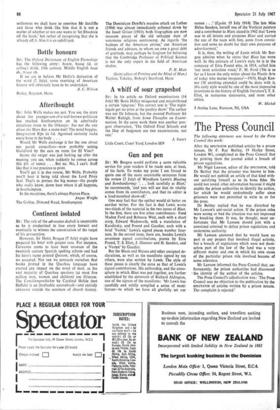Gun and pen
Sir: Mr Burgess would perform a more valuable service for your readers if he made sure, at least, of his facts. To make my point I am forced to quote one of the more unenviable sentences from his review (7 July) of Wyndham Lewis's Blasting and Bombardiering: . . look carefully at Blast,' he recommends, 'and you will see that its vitality comes from its contributors, and that its editor is a loud-mouthed show-off.'
One may feel that the epithet would sit better on another writer. For the fact is that Lewis wrote two-thirds of the material in the two issues of Blast. In the first, there are five other contributors: Ford Madox Ford and Rebecca West, each with a short story, Edward Wadsworth, with a translation of Kandinsky, and Pound and Gaudier, each with a brief 'Vortex.' Lewis's signed pieces number four- teen. In the second issue, there are, besides Lewis's seventeen signed contributions, poems by Ezra Pound, T. S. Eliot, J. Dismorr and H. Sanders, and a 'Vortex' by Gaudier.
But the Blasts and Blesses and other unsigned de- clarations, as well as the manifesto signed by ten others, were also written by Lewis. The style of these pieces is clearly the same as that of Lewis's signed contributions. His authorship, and the atmo- sphere in which Blast was put together, are further established by the statement of Richard Aldington, one of the signers of the manifesto: `Mr Lewis has carefully and wittily compiled a series of mani- festoes—to which we have all gleefully set our
names . . .* (Egoist. 15 July 1914). The late Miss Helen Sanders, herself one of the Vorticist painters and a contributor to Blast, stated in 1962 that 'Lewis was to all intents and purposes Blast and carried the rest of the team with him, some from convic- tion and some no doubt for their own purposes of advertisement.'
It is, then, the writing of Lewis which Mr Bur- gess admires when he states that Blast has worn well. In this estimate of Lewis's style he is in the company of Ezra Pound who, in 1914, called him 'our most articulate voice,' F. M. Ford ('He is as far as I know the only writer about the Plastic Arts of today who matter twopence'-1919), Hugh Ken- ner ('If anything extended could be done with it, this early style would be one of the most impressive inventions in the history of English literature'), T. S. Eliot, in numerous statements, and most other critics.






























 Previous page
Previous page